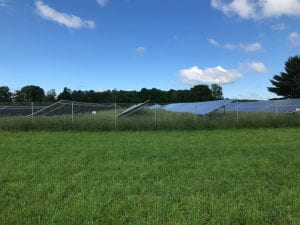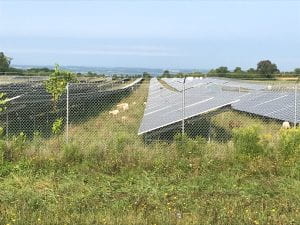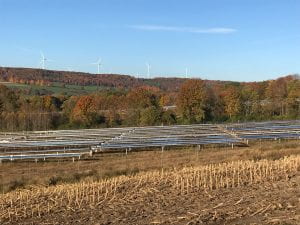In a continued collaboration between Cornell Cooperative Extension, Pennsylvania, and Farm Bureaus of Ohio, Pennsylvania and New York this series of webinars will explore the continued push for development of solar energy projects in agricultural areas of the Northeast. This five part series will address the topic from multiple perspectives and help to identify the opportunities and challenges as well as currently known best practices for integrating the need for renewable energy with other economic and social factors.
Session #1 Video – Impacts of Large-Scale Solar on Rural Communities – A Research Perspective
Research into this topic is still relatively new; however, initial studies offer some insight into how the perceptions, impacts and opportunities around solar and land use. This session will explore current finding on key issues in rural communities, decision making metrics being developed through this research and how communities can integrate these metrics. Additionally, the potential tradeoffs between energy and agriculture and emerging opportunities in agrivoltaics will be discussed.
Local Law for Solar Project Development in Pennsylvania – Slides
Economic Impacts of Solar on Rural Communities – Slides
Session #2 Video – Solar and Agriculture – A Company’s Perspective on the Challenges and Pathways to Successful Integration of Both
Developers of large-scale solar facilities are interested in optimizing the use of the land within the project footprint and continue to work to understand the opportunities and challenges of agrivoltaics, or dual use, setups. The session will also explore the key aspects of the decision-making process developers use for site selection and how they weigh these factors against impacts on land use, particularly when the location contains soil types identified as prime for agriculture production.
Agrivoltaics – Slides
Solar and Agriculture – Slides
Moderator: Jeff Williams, NY Farm Bureau JWilliams@nyfb.org
Panelist:
- Marguerite Wells, Invenergy MWells@invenergyllc.com;
- Josh Bennett/Kevin Campbell, EDF Josh Bennett: Bennett@edf-re.com Kevin Campbell: Kevin.Campbell@edf-re.com
- Iain Ward, Solar Agricultural Services iain@solaragservices.com
Session #3 Video – A Farmer’s Perspective on Solar
Farmers who have looked closely at solar electricity production on their land will discuss their experiences with developers, and their perceptions of the benefits and challenges of solar for agriculture. Discussion will include differences in the scale of solar projects, how solar might impact farmers in varied circumstances, and ideas for optimizing the benefits of a nd mitigating the challenges of solar for agriculture.
A Community Perspective on Solar in New York State – Slides
Speakers:
- Alan Zepp – aczepp@gmail.com see Ag mentor program launches in Pennsylvania (farmprogress.com) and LinkedIn
- Klaas Martens – kandmhfarm@lakevieworganicgrain.com see Meet This Third-Generation Farmer Who Converted His 1,400 Acres to Growing Organic Food – EcoWatch
- Ray Dykeman – raymond.dykeman@gmail.com see New York Employers Are Eager to Hire Migrants. They Can’t. – The New York Times (nytimes.com)
Moderator: David Kay
Session #4 Video – A Community Perspective on Solar
Expanding out beyond the impacts to individual landowners, solar develop can have broader opportunities and challenges for the rural, agricultural based communities that host them. This session will offer observations and ideas for the community level on best practices for successfully integrating solar as a land use. When it is a competing land use and when it can be a complementary land use.
Speakers:
- Katie Malinowski is the Executive Director for the Tug Hill Commission, beginning her career there in 1998 as a natural resources specialist. She leads the state agency’s work with local governments and other partners in planning, natural resources, and community development. She received her MS in Environmental Science – Water Resources from the School of Public and Environmental Affairs, Indiana University, Bloomington, IN. Her undergraduate studies were completed at SUNY Binghamton with a BA in Environmental Studies.
- Matt Johnson is the Planning Director for the Tug Hill Commission and has over 25 years’ experience working with small rural communities in the Tug Hill region on a wide variety of planning and land use issues. Matt assists communities with comprehensive plans, zoning laws, subdivision laws, and GIS projects. He received his Bachelor’s Degree from Syracuse University in 1993 and a Master’s Degree from Boston Architectural College in 2018. He is a member of the American Institute of Certified Planners.
- Matthew Smith is a Planner at the NYS Tug Hill Commission using his technical knowledge to help local governments through the comprehensive plan, zoning code and subdivision law update processes. He has a Bachelor’s Degree in Political Science with a minor in History from Siena College. Matthew has completed an update to the “Planning for Offsite Solar” technical paper for the commission, has given a presentation on the progress and scale of solar buildout for local farmers interested in solar sheep grazing, and has recently completed a regional soils map intended to be a tool for local officials to protect their natural assets and better site incoming solar facilities.
Moderator: Lily Guthrie
Session #5 Video – Question and Answer
A Q&A to cover any and all of the previously presented material in Sessions 1-4 featuring the speakers from this series.





